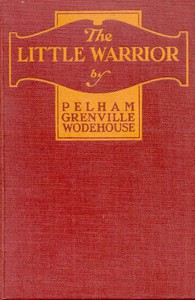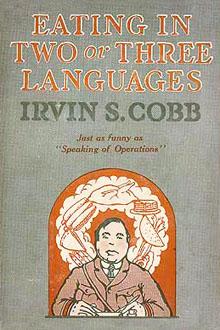The Little Warrior by P. G. Wodehouse (top 50 books to read txt) 📗

- Author: P. G. Wodehouse
Book online «The Little Warrior by P. G. Wodehouse (top 50 books to read txt) 📗». Author P. G. Wodehouse
“We want you to withdraw it.”
“Who’s ‘we’?”
“The other girls and myself.”
Mr Goble jerked his head so violently that the Derby hat flew off, to be picked up, dusted, and restored by the stage-director.
“Oh, so you don’t like it? Well, you know what you can do …”
“Yes,” said Jill, “we do. We are going to strike.”
“What!”
“If you don’t let Mae go on, we shan’t go on. There won’t be a performance tonight, unless you like to give one without a chorus.”
“Are you crazy!”
“Perhaps. But we’re quite unanimous.”
Mr Goble, like most theatrical managers, was not good at words of over two syllables.
“You’re what?”
“We’ve talked it over, and we’ve all decided to do what I said.”
Mr Goble’s hat shot off again, and gambolled away into the wings, with the stage-director bounding after it like a retriever.
“Whose idea’s this?” demanded Mr Goble. His eyes were a little foggy, for his brain was adjusting itself but slowly to the novel situation.
“Mine.”
“Oh, yours! I thought as much!”
“Well,” said Jill, “I’ll go back and tell them that you will not do what we ask. We will keep our make-up on in case you change your mind.”
She turned away.
“Come back!”
Jill proceeded toward the staircase. As she went, a husky voice spoke in her ear.
“Go to it, kid! You’re all right!”
The head-carpenter had broken his Trappist vows twice in a single evening, a thing which had not happened to him since the night three years ago, when, sinking wearily onto a seat in a dark corner for a bit of a rest, he found that one of his assistants had placed a pot of red paint there.
§ 4.To Mr Goble, fermenting and full of strange oaths, entered Johnson Miller. The dance-director was always edgey on first nights, and during the foregoing conversation had been flitting about the stage like a white-haired moth. His deafness had kept him in complete ignorance that there was anything untoward afoot, and he now approached Mr Goble with his watch in his hand.
“Eight twenty-five,” he observed. “Time those girls were on stage.”
Mr Goble, glad of a concrete target for his wrath, cursed him in about two hundred and fifty rich and well-selected words.
“Huh?” said Mr Miller, hand to ear.
Mr Goble repeated the last hundred and eleven words, the pick of the bunch.
“Can’t hear!” said Mr Miller, regretfully. “Got a cold.”
The grave danger that Mr Goble, a thick-necked man, would undergo some sort of a stroke was averted by the presence-of-mind of the stage-director, who, returning with the hat, presented it like a bouquet to his employer, and then his hands being now unoccupied, formed them into a funnel and through this flesh-and-blood megaphone endeavored to impart the bad news.
“The girls say they won’t go on!”
Mr Miller nodded.
“I said it was time they were on.”
“They’re on strike!”
“It’s not,” said Mr Miller austerely, “what they like, it’s what they’re paid for. They ought to be on stage. We should be ringing up in two minutes.”
The stage director drew another breath, then thought better of it. He had a wife and children, and, if dadda went under with apoplexy, what became of the home, civilization’s most sacred product? He relaxed the muscles of his diaphragm, and reached for pencil and paper.
Mr Miller inspected the message, felt for his spectacle-case, found it, opened it, took out his glasses, replaced the spectacle-case, felt for his handkerchief, polished the glasses, replaced the handkerchief, put the glasses on, and read. A blank look came into his face.
“Why?” he enquired.
The stage director, with a nod of the head intended to imply that he must be patient and all would come right in the future, recovered the paper, and scribbled another sentence. Mr Miller perused it.
“Because Mae D’Arcy has got her notice?” he queried, amazed. “But the girl can’t dance a step.”
The stage director, by means of a wave of the hand, a lifting of both eyebrows, and a wrinkling of the nose, replied that the situation, unreasonable as it might appear to the thinking man, was as he had stated and must be faced. What, he enquired—through the medium of a clever drooping of the mouth and a shrug of the shoulders—was to be done about it?
Mr Miller remained for a moment in meditation.
“I’ll go and talk to them,” he said.
He flitted off, and the stage director leaned back against the asbestos curtain. He was exhausted, and his throat was in agony, but nevertheless he was conscious of a feeling of quiet happiness. His life had been lived in the shadow of the constant fear that some day Mr Goble might dismiss him. Should that disaster occur, he felt, there was always a future for him in the movies.
Scarcely had Mr Miller disappeared on his peace-making errand, when there was a noise like a fowl going through a quickset hedge, and Mr Saltzburg, brandishing his baton as if he were conducting an unseen orchestra, plunged through the scenery at the left upper entrance and charged excitedly down the stage. Having taken his musicians twice through the overture, he had for ten minutes been sitting in silence, waiting for the curtain to go up. At last, his emotional nature cracking under the strain of this suspense, he had left his conductor’s chair and plunged down under the stage by way of the musician’s bolthole to ascertain what was causing the delay.
“What is it? What is it? What is it? What is it?” enquired Mr Saltzburg. “I wait and wait and wait and wait and wait. … We cannot play the overture again. What is it? What has happened?”
Mr Goble, that overwrought soul, had betaken himself to the wings, where he was striding up and down with his hands behind his back, chewing his cigar. The stage director braced himself once more to the task of explanation.
“The girls have struck!”
Mr Saltzburg blinked through his glasses.
“The girls?” he repeated blankly.
“Oh, damn it!” cried the stage director, his patience at last giving way. “You know what a girl is, don’t you?”
“They have what?”
“Struck! Walked out on us! Refused to go on!”
Mr Saltzburg reeled under the blow.
“But it is impossible! Who is to sing the opening chorus?”
In the presence of one to whom he could relieve his mind without fear of consequences, the stage director became savagely jocular.
“That’s all arranged,” he said. “We’re going to dress the carpenters in skirts. The audience won’t notice anything wrong.”
“Should I speak to Mr Goble?” queried Mr Saltzburg doubtfully.
“Yes, if you don’t value your life,” returned the stage director.
Mr Saltzburg pondered.
“I will go and speak to the children,” he said. “I will talk to them. They know me! I will make them be reasonable.”
He bustled off in the direction taken by Mr Miller, his coattails flying behind him. The stage director, with a tired sigh, turned to face Wally, who had come in through the iron pass-door from the auditorium.
“Hullo!” said Wally cheerfully. “Going strong? How’s everybody at home? Fine! So am I! By the way, am I wrong or did I hear something about a theatrical entertainment of some sort here tonight?” He looked about him at the empty stage. In the wings, on the prompt side, could be discerned the flannel-clad forms of the gentlemanly members of the male ensemble, all dressed up for Mrs Stuyvesant van Dyke’s tennis party. One or two of the principals were standing perplexedly in the lower entrance. The O. P. side had been given over by general consent to Mr Goble for his perambulations. Every now and then he would flash into view through an opening in the scenery. “I understood that tonight was the night for the great revival of comic opera. Where are the comics, and why aren’t they opping?”
The stage director repeated his formula once more.
“The girls have struck!”
“So have the clocks,” said Wally. “It’s past nine.”
“The chorus refuse to go on.”
“No, really! Just artistic loathing of the rotten piece, or is there some other reason?”
“They’re sore because one of them has been given her notice, and they say they won’t give a show unless she’s taken back. They’ve struck. That Mariner girl started it.”
“She did!” Wally’s interest became keener. “She would!” he said approvingly. “She’s a heroine!”
“Little devil! I never liked that girl!”
“Now there,” said Wally, “is just the point on which we differ. I have always liked her, and I’ve known her all my life. So, shipmate, if you have any derogatory remarks to make about Miss Mariner, keep them where they belong—there!” He prodded the other sharply in the stomach. He was smiling pleasantly, but the stage director, catching his eye, decided that his advice was good and should be followed. It is just as bad for the home if the head of the family gets his neck broken as if he succumbs to apoplexy.
“You surely aren’t on their side?” he said.
“Me!” said Wally. “Of course I am. I’m always on the side of the down-trodden and oppressed. If you know of a dirtier trick than firing a girl just before the opening, so that they won’t have to pay her two weeks’ salary, mention it. Till you do, I’ll go on believing that it is the limit. Of course I’m on the girls’ side. I’ll make them a speech if they want me to, or head the procession with a banner if they are going to parade down the boardwalk. I’m for ’em, Father Abraham, a hundred thousand strong. And then a few! If you want my considered opinion, our old friend Goble has asked for it and got it. And I’m glad—glad—glad, if you don’t mind my quoting Pollyanna for a moment. I hope it chokes him!”
“You’d better not let him hear you talking like that!”
“An contraire, as we say in the Gay City, I’m going to make a point of letting him hear me talk like that! Adjust the impression that I fear any Goble in shining armor, because I don’t. I propose to speak my mind to him. I would beard him in his lair, if he had a beard. Well, I’ll clean-shave him in his lair. That will be just as good. But hist! whom have we here? Tell me, do you see the same thing I see?”
Like the vanguard of a defeated army, Mr Saltzburg was coming dejectedly across the stage.
“Well?” said the stage-director.
“They would not listen to me,” said Mr Saltzburg brokenly. “The more I talked, the more they did not listen!” He winced at a painful memory. “Miss Trevor stole my baton, and then they all lined up and sang the ‘Star-Spangled Banner’!”
“Not the words?” cried Wally incredulously. “Don’t tell me they knew the words!”
“Mr Miller is still up there, arguing with them. But it will be of no use. What shall we do?” asked Mr Saltzburg helplessly. “We ought to have rung up half an hour ago. What shall we do-oo-oo?”
“We must go and talk to Goble,” said Wally. “Something has got to be settled quick. When I left, the audience was getting so impatient that I thought he was going to walk out on us. He’s one of those nasty, determined-looking men. So come along!”
Mr Goble, intercepted as he was about to turn for another walk up-stage, eyed the deputation sourly and put the same question that the stage director had put to Mr Saltzburg.
“Well?”
Wally came briskly to the point.
“You’ll have to give in,” he said, “or else go and make a speech to the audience, the burden of which will be that they can have their money back by applying at the box-office. These Joans of Arc have got you by the short hairs!”
“I won’t give in!”
“Then give out!” said Wally. “Or pay out, if you prefer it. Trot along and tell the audience that the four dollars fifty in the house will be refunded.”
Mr Goble gnawed his cigar.
“I’ve been in the show business fifteen years …”
“I know. And this sort of thing has never happened to you before. One gets new experiences.”
Mr Goble cocked his cigar at a fierce angle, and glared at Wally. Something told him that Wally’s sympathies were not wholly with him.
“They can’t do this sort of thing to me!” he growled.
“Well, they are doing it to someone, aren’t they,” said Wally, “and, if it’s not you, who is it?”
“I’ve a damned good mind to fire them all!”
“A corking idea! I can’t see a single thing wrong with it except that it would hang up the production for another five weeks and lose you your bookings and cost you a week’s rent of this theatre for nothing and mean having all the dresses made over and lead to all your principals going off and getting other jobs. These trifling things apart, we may call the suggestion a bright one.”
“You talk too damn much!” said Mr Goble, eyeing him





Comments (0)